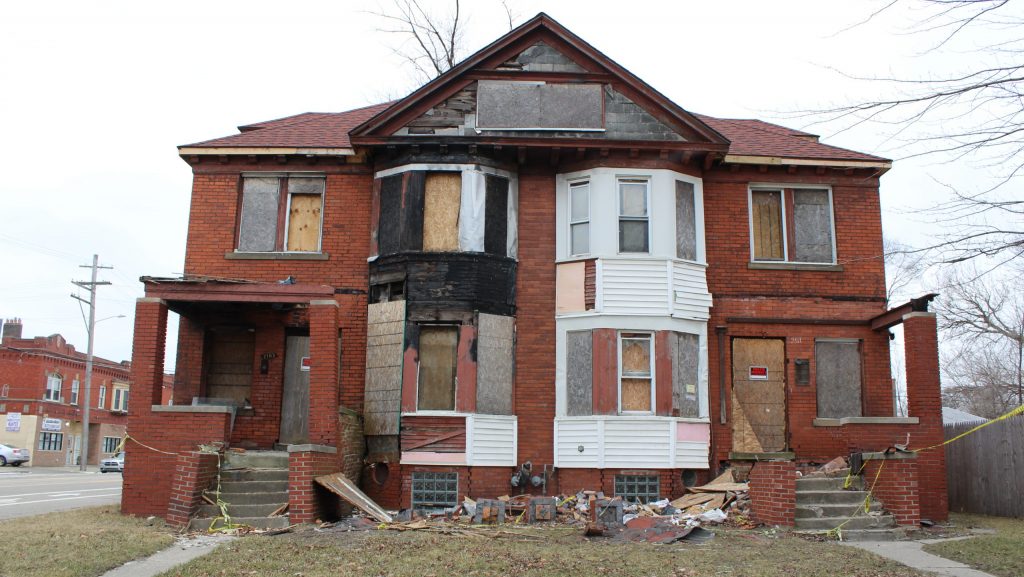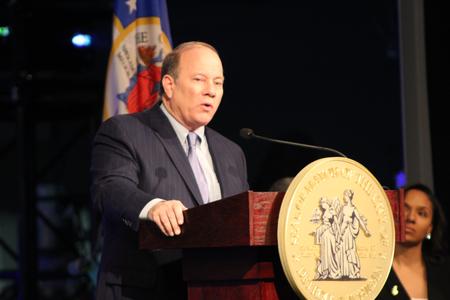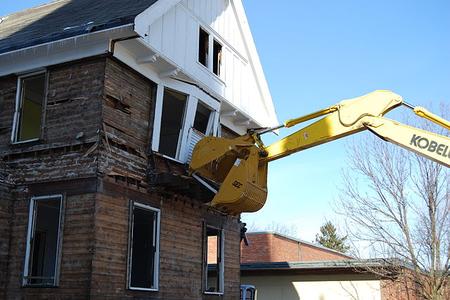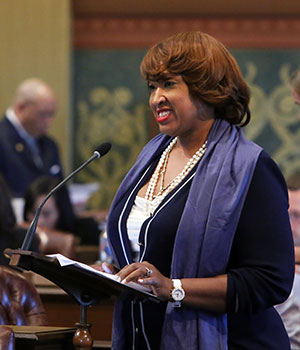Doubt Looms Large Over Detroit Demolitions, as City Council Weighs Blight Bond Proposal
As federal and state funds for demolition dry up, the city is seeking a $250-million bond to take over the troubled program.

A judge has temporarily barred real estate firm Real Token from collecting rent on hundreds of properties that violate city code.
Detroit Mayor Mike Duggan made a big pitch to the city this fall: If residents vote “YES” on a $250-million bond sale during the March primary election, his administration will make sure that neighborhoods are “blight free” in five-years’ time.
“There isn’t any more federal money, there’s no more state money. We’re going to have to do this on our own.” – Mayor Mike Duggan
The measure would extend funding for the largest municipal demolition program in the country, a program that the U.S. government has been supporting for years through Hardest Hit Funds.
Click on the player above to listen to WDET’s Eli Newman’s report on Detroit’s troubled demolition program.

Building officials say since 2014, Detroit has dismantled nearly 20,000 structures. On average, that would mean the city is tearing down a home roughly every three hours. That’s a neighborhood block, every week. But even at that rate, Detroit is only halfway to ridding itself of blight.
“There isn’t any more federal money, there’s no more state money,” Duggan told reporters at the September press conference announcing the effort. “If we’re going to do this, we’re going to have to do this on our own. The good news is that the City’s finances are so strong and our credit rating has improved that we can sell this bond issue with no increase in taxes.”
No receipts, no transparency
Duggan’s campaign to put the bond proposal on the ballot hit a snag this month.
An internal review of city demolitions revealed major flaws in the program. Among its many failures, the audit found:
- No evidence that demolition waste with asbestos was being disposed of properly,
- No evidence that clean soil was used to fill demolition holes, and
- No evidence that contractors were providing progress reports for their work.
Mark Lockridge is Detroit’s Auditor General. His job was to assess the demolition program based on rules that city agencies made for themselves. He says, for the most part, demolition officials could not even show basic receipts.
“They need to be more transparent in what they’re doing.” – Mark Lockridge, Detroit’s Auditor General
“They need to be more transparent in what they’re doing,” Lockridge says. “I’m not a demolition person myself. I’m not the expert at the work that they’re doing.”
Lockridge and his team of auditors took four years to put together their findings, which included issuing subpoenas to the city for proper documents.
“In 2017, is when we began to focus on city-funded demolitions, and that is when the information really began to stall,” Lockridge says. “That was the difficult part of our audit, was that we couldn’t get information in a timely fashion.”
Officials connected to the demolition program have rejected many claims made by the audit, claiming the report is full of errors based on old samples, faulty standards and “cherry-picked” examples. But Lockridge says city officials had months to address any issues they had with the audit.
“If we’re not getting the information in a timely fashion, or if we’re not getting the right information, then that kind of speaks to their operations,” Lockridge says.
“Blight was created by our financial institutions that allowed the foreclosure to take place.” – State Representative Sherry Gay-Dagnogo
Restructuring the demolition program
The audit has not slowed down efforts by the mayor’s office to move forward with the bond question. The administration has pledged to restructure the program in response to criticism.
“We have decided to bring the entire demolition program back into the city as a department,” says Detroit’s Chief Financial Officer Dave Masseron. “There will be a demolition department created that will be subject to the same oversight as every other department in the city.”
Masseron says the re-organization would add rehabs and renovations to the city program. To keep demolitions at its current pace, Detroit homeowners will continue to pay a 9-mill property tax to pay off city debt. That tax rate would otherwise drop in the years ahead. Masseron says it’s a price worth paying for, as demolitions provide Detroit the biggest “return on investment” in terms of capital improvements.
“It drives property values higher, it makes neighborhoods safer,” Masseron says. “Our fire load, or the amount of fire runs we have, has been reduced by over 47 percent.”
“We want to make sure that we are advancing efficacy, that we have transparency.” – State Representative Sherry Gay-Dagnogo
Masseron says the bond sale would free up money from the city’s general fund to be used for other needs, like the city’s looming pension cliff and retiree health care obligations. Regardless of the supposed benefits of Detroit demolitions, many still have concerns about the program’s oversight, its timeline, and the drivers of blight itself.
“Blight was created by our financial institutions that allowed the foreclosure to take place,” State Representative Sherry Gay-Dagnogo says. “As we have been progressing out of bankruptcy, we’ve only delayed some things.”
Detroit City Council will hold a public hearing on a $250-million blight bond proposal from 5:00 – 8:00 pm at the Coleman A. Young Municipal Center tonight.
“Blank check”
Gay-Dagnogo says the bond is like a “blank check,” as the proposed sale does not represent the full cost the program has on taxpayers since the city would need to spend hundreds of millions of dollars more to administer the program. The Detroit state lawmaker says without cost-containing measures, it’s wasteful to fight blight by tearing-down homes when money could be spent on foreclosure prevention and other efforts that stop vacancies from happening in the first place.
“To see that you have demolitions that are in excess of $26,000 for one property, when we could have kept a resident in their home if we had provided them the grants that were afforded to them by the U.S. Department of Housing, we could have done that,” Gay-Dagnogo says. “We want to make sure that we are advancing efficacy, that we have transparency.”
If the question is approved, Detroiters will need to decide for themselves whether it’s worth paying for demolitions out of pocket, as taxpayers would spend the next 30-years paying off the debt. Detroit City Council has until the end of the month to approve the $250-million bond proposal if they want it to appear on the March primary ballot.
Support the news you love.
Here at WDET, we strive to make our journalism accessible to everyone. As a public media institution, we maintain our journalistic integrity through independent support from readers like you. If you value WDET as your source of news, music, and conversation, please consider making a gift today. Even $5 a month helps!


